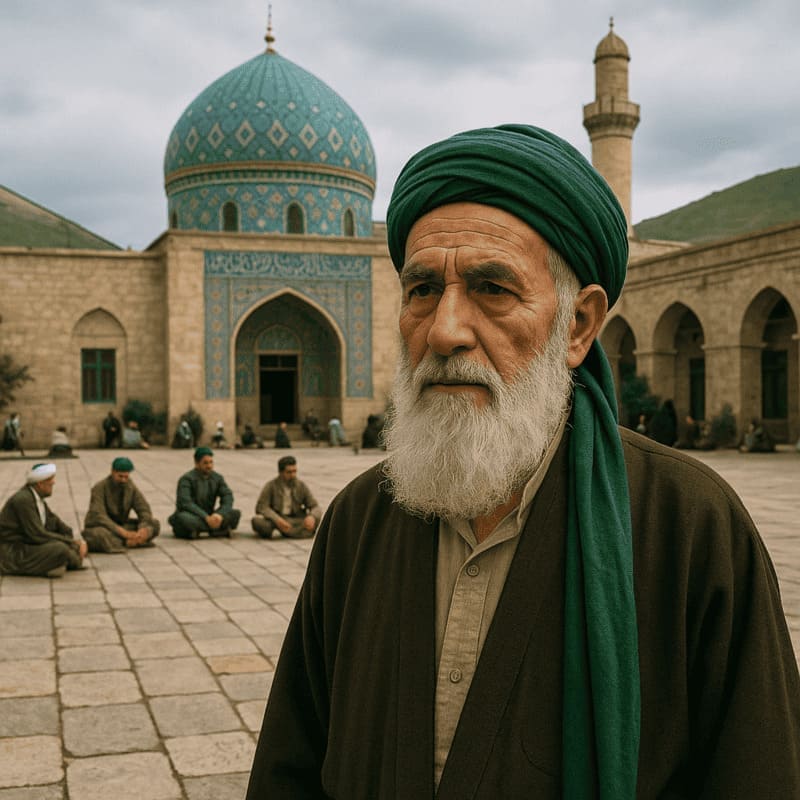What Is the Kasnazani Sufi Order? A Historical Glimpse into Its Origins and Development
The Kasnazani Sufi order is one of the prominent spiritual paths within the Qadiriyya Sufi tradition. Its roots trace back to Sheikh Abdul Qadir al-Gilani, yet the order gained its unique identity under Sheikh Abdul Karim al-Kasnazani, who gave it its modern form. The name “Kasnazan” refers to a mountainous area near Sulaymaniyah, where Sheikh Abdul Karim established the spiritual center of the order.
The Kasnazani path focuses on divine love, spiritual tolerance, and an inclusive approach to religion. It has long attracted followers from diverse social and cultural backgrounds. During the early 20th century, the order expanded among the Kurdish people and later spread to other Iraqi cities and even abroad.
The history of the Kasnazani path is a blend of deep spirituality and openness, offering a way toward inner peace and moral elevation. Though religious in nature, the order does not impose beliefs; instead, it invites individuals to embark on a personal spiritual journey through dhikr (remembrance of God), self-reflection, and contemplation.
Today, the Kasnazani order is one of the most influential Sufi paths in Iraqi Kurdistan, with a strong presence in Sulaymaniyah and beyond.
Prominent Sheikhs of the Kasnazani Order and Their Role in Spreading Sufism
The Kasnazani order has been led by several influential spiritual leaders who played a major role in its expansion and development. Foremost among them is Sheikh Abdul Karim al-Kasnazani, the spiritual founder of the modern form of the order. Born into a devout religious family, he dedicated his life to reviving and promoting Sufi teachings centered around love and tolerance.
After his passing, leadership passed to his son, Sheikh Nehro al-Kasnazani, who continued the mission of spreading the order’s message across Kurdish regions and beyond. Sheikh Nehro combines traditional Sufi knowledge with a contemporary understanding of modern challenges, appealing to younger generations and intellectual circles.
What distinguishes Kasnazani sheikhs is their calm, inclusive rhetoric, emphasizing ethical conduct, humility, and spiritual service. They go beyond mere rituals, urging followers to embody moral virtues such as honesty, compassion, and non-violence.
Additionally, Kasnazani sheikhs have played a prominent role in interfaith and intercultural dialogue, especially in the diverse social fabric of Kurdistan. They view Sufism as a bridge between hearts—not a weapon of division.
Rituals and Spiritual Practices of the Kasnazani Followers in Sulaymaniyah
Followers of the Kasnazani order in Sulaymaniyah engage in a range of spiritual practices designed to purify the soul and bring them closer to God. One of the most central practices is group dhikr—the collective chanting of God’s names in rhythmic sequences. This creates a powerful spiritual atmosphere of inner stillness and connection.
Another hallmark practice is what’s known as “spiritual ecstasy” or spiritual attraction, during which some followers may enter a deep state of inner focus, accompanied by physical movement or vocal expressions. These states are viewed as intimate moments of spiritual connection with the divine.
Beyond rituals, the order emphasizes ethical discipline, respect for others, and service to those in need. Followers are encouraged to live by values such as truthfulness, humility, and avoiding arrogance—as these are seen as keys to spiritual progress.
Special gatherings are held on religious occasions such as the Prophet’s birthday or the anniversaries of major sheikhs. These events include Sufi chants and collective prayers, creating a mix of spirituality and culture that strengthens bonds among followers.
The Kasnazani Order and Kurdish Society: Harmony Between Religion and Culture
The Kasnazani order has deeply integrated into Kurdish cultural life, especially in Sulaymaniyah. This harmony isn’t accidental—it stems from a deep understanding of the Kurdish people’s spiritual and cultural needs. The Kurdish community naturally leans toward mysticism, poetry, and music, all of which are present in Kasnazani practices.
Unlike more rigid religious models, the Kasnazani order provides a flexible, spiritual framework that resonates with a wide range of people. It encourages a personal, heartfelt relationship with the divine rather than strict dogma or legalism.
Kasnazani zawiyas (Sufi lodges) have also served as social centers—places not only for worship but for learning, mediation, and communal support. In rural Kurdish areas, the sheikh is often a respected advisor and community leader.
Importantly, the order uses the Kurdish language in its rituals and communication, which enhances accessibility and emotional connection. Many of the spiritual songs and chants performed are in Kurdish, reaching deeply into the hearts of listeners.
The Expansion of the Kasnazani Order Beyond Kurdistan: How It Reached Other Regions
Though the Kasnazani order originated in Kurdistan, it has expanded far beyond the region thanks to the efforts of its sheikhs and devoted followers. Under the leadership of Sheikh Abdul Karim and Sheikh Nehro al-Kasnazani, the order spread to major Iraqi cities such as Baghdad, Kirkuk, Mosul, and Basra, and eventually reached international communities.
One reason for this expansion is the order’s peaceful and inclusive message, which appeals to individuals seeking a spiritual alternative to extremism or dogmatism. Beyond physical zawiyas, the order has used modern tools—such as websites, books, and public lectures—to promote its teachings.
Kurdish and Iraqi diaspora communities in Europe, particularly in Germany and the UK, have also played a role in spreading the order abroad. Kasnazani followers in these countries have established spiritual centers that welcome both Muslims and non-Muslims.
Interestingly, some followers are not Muslim by birth but are drawn to Sufism out of a general interest in spirituality. This illustrates how the Kasnazani order serves as a cultural and spiritual bridge between diverse communities.
Supporters and Critics of the Kasnazani Order: Between Appreciation and Controversy
Like many spiritual movements, the Kasnazani order faces a range of opinions. Supporters see it as a true path to inner peace and divine connection, away from rigid interpretations of religion. They admire the order’s focus on love, remembrance (dhikr), tolerance, and moral values.
On the other hand, critics raise several concerns. Some view the order’s physical practices during dhikr, such as ecstatic movements, as religious innovations (bid’ah) not rooted in orthodox Islam. Others criticize the socio-political influence of its sheikhs, fearing that spiritual leadership may become a parallel authority.
Despite criticism, the Kasnazani order enjoys widespread respect in Kurdistan—even among non-followers—due to its peaceful nature and absence of sectarianism. Its adherents are often well-integrated into society and actively contribute in fields like education, medicine, and social work.
Ultimately, the Kasnazani path exemplifies how Sufism can remain relevant in modern society and foster meaningful debate about religion, identity, and inner transformation.

